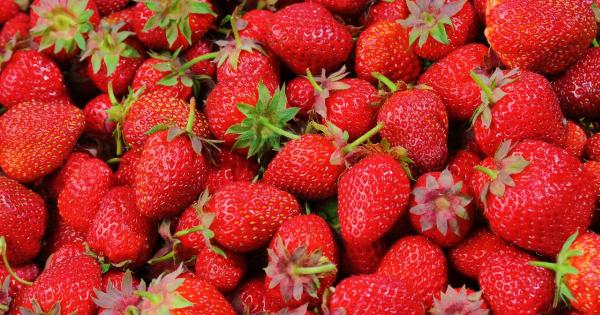A healthy and safe pregnancy starts with good nutrition. Eating a well-balanced diet is essential for your baby’s growth and development.
During pregnancy, your body needs extra vitamins and minerals to help your baby grow and to support changes in your own body.
The 30 best diets for a safer pregnancy
Here are 30 diets that can help you have a safer and healthier pregnancy:.
1. Mediterranean diet
The Mediterranean diet is rich in fruits, vegetables, whole grains, lean proteins, and healthy fats. It’s a balanced and nutritious diet that can help reduce the risk of gestational diabetes and other pregnancy complications.
2. DASH diet
The DASH diet is designed to lower blood pressure and is rich in fruits, vegetables, whole grains, lean proteins, and low-fat dairy products. It’s a healthy diet that can help prevent hypertension and other pregnancy complications.
3. Vegetarian diet
A vegetarian diet can be a healthy choice during pregnancy as long as you ensure that you’re getting enough protein, iron, calcium, and other essential nutrients. The key is to eat a variety of whole foods and legumes.
4. Vegan diet
If you follow a vegan diet, it’s important to ensure that you’re getting enough protein, iron, calcium, and other essential nutrients for your baby and your own health.
Supplements may be necessary, but it’s best to consult with your healthcare provider first.
5. Gluten-free diet
If you have celiac disease or a gluten intolerance, you may need to follow a gluten-free diet during pregnancy to prevent complications.
It’s important to ensure that you’re getting enough nutrients from gluten-free whole grains, fruits, vegetables, and lean proteins.
6. Low-carb diet
A low-carb diet may be helpful for women who are overweight or have gestational diabetes. However, it’s important to ensure that you’re getting enough nutrients from non-starchy vegetables, protein, and healthy fats.
7. High-protein diet
A high-protein diet can help you maintain a healthy weight and support your baby’s growth and development.
However, it’s important to ensure that you’re not consuming too much animal protein and that you’re getting enough nutrients from plant-based sources.
8. Paleo diet
The paleo diet emphasizes whole foods, lean proteins, fruits, and vegetables while avoiding processed foods, refined sugars, and grains.
However, it’s important to ensure that you’re getting enough nutrients from non-starchy vegetables and fruits.
9. Whole30 diet
The Whole30 diet eliminates processed foods, grains, dairy, and added sugars for 30 days to help reset your diet and improve your health.
However, it’s important to ensure that you’re getting enough nutrients from non-starchy vegetables, lean proteins, and healthy fats.
10. Ketogenic diet
The ketogenic diet is a high-fat, low-carb diet that may be helpful for women with gestational diabetes. However, it’s important to ensure that you’re getting enough nutrients from non-starchy vegetables, protein, and healthy fats.
11. Traditional Asian diet
The traditional Asian diet is rich in whole grains, fruits, vegetables, fish, and soy products. It’s a balanced and nutritious diet that can help prevent pregnancy complications.
12. Indian diet
The Indian diet is rich in spices, lentils, vegetables, fruits, whole grains, and lean proteins. It’s a balanced and nutritious diet that can help prevent pregnancy complications.
13. Mediterranean-inspired DASH diet
The Mediterranean-inspired DASH diet is a healthy and balanced diet that can help prevent gestational diabetes and other pregnancy complications. It emphasizes fruits, vegetables, whole grains, lean proteins, and healthy fats.
14. South Beach diet
The South Beach diet is a low-carb, high-protein diet that may be helpful for women who are overweight or have gestational diabetes.
However, it’s important to ensure that you’re getting enough nutrients from non-starchy vegetables, lean proteins, and healthy fats.
15. Zone diet
The Zone diet is a balanced diet that emphasizes whole foods, lean proteins, healthy fats, and low-glycemic carbohydrates.
It may be helpful for women with gestational diabetes, but it’s important to ensure that you’re getting enough nutrients from non-starchy vegetables and fruits.
16. Macrobiotic diet
The macrobiotic diet is a balanced and nutritious diet that emphasizes whole grains, vegetables, beans, and sea vegetables. It may be helpful for preventing pregnancy complications and promoting overall health.
17. Ayurvedic diet
The Ayurvedic diet is a balanced and nutritious diet that emphasizes natural foods and spices. It may be helpful for promoting overall health and preventing pregnancy complications.
18. Clean eating diet
The clean eating diet is a balanced and nutritious diet that emphasizes whole foods, lean proteins, healthy fats, and fruits and vegetables. It can help prevent pregnancy complications and promote overall health.
19. Low-fat diet
A low-fat diet may be helpful for preventing hypertension and other pregnancy complications. However, it’s important to ensure that you’re getting enough nutrients from fruits, vegetables, and healthy fats.
20. Low-calorie diet
A low-calorie diet may be helpful for women who are overweight or have gestational diabetes. However, it’s important to ensure that you’re getting enough nutrients from whole foods, lean proteins, and healthy fats.
21. Mediterranean-inspired vegetarian diet
The Mediterranean-inspired vegetarian diet is a balanced and nutritious diet that can help prevent pregnancy complications. It emphasizes fruits, vegetables, whole grains, legumes, and healthy fats.
22. Flexitarian diet
The flexitarian diet is a plant-based diet that allows for occasional consumption of lean meats and seafood. It may be helpful for promoting overall health and preventing pregnancy complications.
23. Intermittent fasting diet
Intermittent fasting is a way of eating that involves cycling between periods of fasting and eating. It may be helpful for women with gestational diabetes, but it’s important to consult with your healthcare provider first.
24. Mindful eating diet
The mindful eating diet involves paying attention to your body’s hunger cues and practicing moderation with food. It can help promote healthy eating habits during pregnancy.
25. Low-FODMAP diet
The low-FODMAP diet is designed to alleviate symptoms of irritable bowel syndrome. It involves avoiding foods that are high in fermentable carbs.
However, it’s important to ensure that you’re getting enough nutrients from low-FODMAP fruits, vegetables, and lean proteins.
26. Low-sugar diet
A low-sugar diet may be helpful for preventing gestational diabetes and other pregnancy complications. However, it’s important to ensure that you’re getting enough nutrients from whole foods, lean proteins, and healthy fats.
27. Paleo-inspired vegetarian diet
The paleo-inspired vegetarian diet is a balanced and nutritious diet that can help prevent pregnancy complications. It emphasizes fruits, vegetables, whole grains, and legumes.
28. Anti-inflammatory diet
The anti-inflammatory diet involves consuming foods that are rich in anti-inflammatory compounds. It can help manage inflammation and prevent pregnancy complications.
29. Plant-based diet
A plant-based diet is a diet that emphasizes fruits, vegetables, whole grains, legumes, nuts, and seeds. It can help promote overall health and prevent pregnancy complications.
30. Balanced diet
A balanced diet that includes a variety of whole foods, lean proteins, healthy fats, and fruits and vegetables is key for a safe and healthy pregnancy.
Conclusion
Eating a healthy and balanced diet is essential for a safe and healthy pregnancy. The 30 diets listed above are all nutritious and balanced options that can help prevent pregnancy complications.
Consult your healthcare provider before starting any new diet.






















